Saudi Arabia facing tough choices in Yemen
Losing ground, losing influence

Every headline today concerning Saudi Arabia and the conflict in Yemen contains the words “crunch time.”
Every. Single. One.
It’s an accurate assessment, of course, and it does a good job of describing the urgency that Saudi and western powers are finding themselves operating under.
Saudi Arabia has now spent 11 weeks conducting airstrikes on key strategic targets in Yemen in an effort to drive back the Iranian-backed Houthi rebels and bolster local fighting forces loyal to deposed President Abd-Rabbu Mansour Hadi. The strikes have done their job, destroying heavy artillery and machinery, and creating a chaotic playing field for rebel ground forces.
But:
Despite the destruction of much of their heavy weaponry, the Houthi militia and army forces loyal to former president Ali Abdullah Saleh control most of the country’s populated west and still daily attack Saudi territory with mortar fire or missiles.
The possibility of a ground operation in support of the ragtag local groups still fighting the Houthis in Aden, Taiz, Marib and al-Dhala appears to have been discounted by the Saudis and their allies in an Arab coalition from early on.
Riyadh may soon have to face an unpalatable choice: accept the de facto control of its foes over Sanaa and cut a deal, or keep fighting with the risk of Yemen sinking into total chaos, becoming a permanent threat to Saudi security.
U.N.-sponsored talks start in Geneva next week aimed at ending almost two months of war, which has killed more than 2,500 people, but there is little sign either Hadi or the Iranian-backed Houthis are ready to make compromises.
Saudi also finds itself under fire from Sunni jihadists, who have taken advantage of the tensions in Yemen and inserted themselves across the border.
And then there’s the Saudi-alleged rise of Iranian influence via the Houthi, which analysts and western bureaucrats seem to be ignoring entirely:
An Iranian member of parliament’s boast last year that Sanaa had become the fourth Arab capital to fall to Tehran’s influence after Baghdad, Beirut and Damascus when the Houthis took the city seemed to confirm Saudi fears.
When daily direct flights started between Tehran and Houthi-controlled Sanaa in January, Riyadh believed they were carrying weapons and other materiel that would ultimately threaten the kingdom directly. It was a turning point in their approach.
“You have to remember the situation three months ago. Without strikes, the Houthis would be everywhere. The Iranians would be more present than ever before. Right or wrong, this was their feeling,” said a Gulf-based diplomat on Saudi thinking.
However, most senior Saudi figures now accept the military campaign can achieve little more and it is time for talks, even though the Houthis and Saleh hold the strongest cards by controlling swathes of Yemen, the diplomat said.
To complicate things further, the barrage of Saudi firepower isn’t helping the Kingdom’s image on the international stage:
Witnesses and officials in Yemen say a Saudi-led airstrike hit a public bus on a highway north of the southern city of Aden, splitting the vehicle in half and killing at least 20 civilian passengers.
They said Thursday that airstrikes also hit a family traveling in a private car and a farmer driving a pick-up truck loaded with potatoes, also near Aden, over the last 48 hours.
A senior military official running an operations room in Aden allied with the Saudi-led coalition said he complained to the Saudis about the incidents. The officials and witnesses spoke on condition of anonymity for fear of reprisal.
Fear. Mistrust. Revenge. While I’m glad that news out of Yemen is finally hitting the airwaves, I’m disappointed in the fact that it only really started generating hot takes after the Saudis launched their air campaign against the Houthi.
As I’ve said previously, this is not a new situation. The Houthi started making (short, bare-bones) headlines last year, but this situation has been simmering for years. The US and western-backed powers may have soured on Saudi’s insistence that the Houthi and anti-Hadi forces be repelled, but I’m willing to float the idea that that’s only happening because the entire conflict has turned into such a PR nightmare for the “peace through diplomacy” crowd.
Donations tax deductible
to the full extent allowed by law.








Comments
Tom Lehrer would say that’s Okay; The balance of power’s maintained that way.
Saudia Arabia is a weak, feckless welfare state attached to an oil well and has recently begged Pakistan for military aircraft, warships and soldiers. In the end they all expect American blood to be shed.
http://www.reuters.com/article/2015/04/06/us-yemen-security-pakistan-idUSKBN0MX01H20150406
Saudi Arabia’s existence is built on foreign labor that builds their palaces and cleans their toilets and to think that the U.S. kisses up to them is beyond the pale.
Yemen: A shining success!
The pace is picking up.
More evidence that the idiots who claimed the problems in the Middle East and muslim world were caused by US meddling are just insane. Without strong US influence, the place devolves into anarchy.
Obama will push the Iranian Army on them ‘to maintain order’. Next up, Obama’s conquest of Oman to seal off the entire Straits of Hormuz for sole Iranian control.